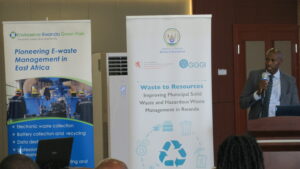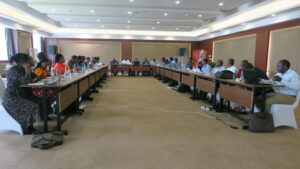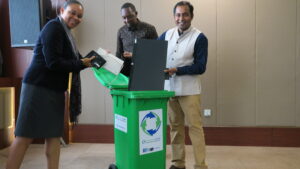On 26th January 2023, GGGI in collaboration with Enviroserve and Rwanda Cooling Initiative (R-Cool) hosted a stakeholder consultation workshop at M-Hotel in Kigali City. The workshop gathered 44 participants; 29.5% females and 72.7% males including government Officials, Facility managers from audited buildings on energy performance, cooling appliances vendors, financial institutions, HVAC association, e-waste repairing technicians and Academia.
On behalf of GGGI Rwanda, Dheeraj Arrabothu, the Senior Green Building Officer, shared his opening remarks welcoming every participant from different institutions. He said that E-waste is one of the three main outcomes of the GGGI’s Waste to Resources Project and Rwanda is playing a key role as a leader in implementing e-waste management strategies. However, there are challenges in collection of e-wastes. He also mentioned that Rwanda signed the Kigali Amendment to the Montreal Protocol on reducing Global Warming, this require all of us get rid of the old cooling appliances such as ACs and refrigerators that have HFCs and buy the new ones that are energy efficient and environmentally friendly refrigerants. He concluded his remarks saying that this stakeholder consultation workshop will help us to put together ideas on how to raise awareness on e-waste management.
On behalf of Rwanda Environment Management Authority (REMA), Beata AKIMPAYE, the Environmental Compliance and Enforcement Division Manager gave the welcome remarks by first acknowledging and thanking GGGI for their efforts on Environmental protection and waste management. She highlighted that this project helps to prevent hazardous waste, e-waste can contribute to the groundwater, soil, and air pollution, depletion of ozone layer and contribute to climate change. She said that through this workshop, different ideas and strategies to collect and handle the e-waste will be discussed. She closed her remarks, wishing all participants a fruitful workshop.
Morris KAYITARE from R-Cooling Initiative,  gave an overview of the “Green On-wage (GO) Mechanism” and the National Cooling Strategy (NCS) that commenced in Rwanda in 2019. The purpose of the NCS is to transform the market towards energy efficient and climate friendly cooling. The cooling strategy is divided into three parts: Regulation, Information, and Incentives. The NCS has six key objectives; 1) Minimum Energy Performance Standards; 2) Labelling; 3) Product Registration System; 4) Financing; 5) Awareness Campaign; and 6) Cold Chain Development.
gave an overview of the “Green On-wage (GO) Mechanism” and the National Cooling Strategy (NCS) that commenced in Rwanda in 2019. The purpose of the NCS is to transform the market towards energy efficient and climate friendly cooling. The cooling strategy is divided into three parts: Regulation, Information, and Incentives. The NCS has six key objectives; 1) Minimum Energy Performance Standards; 2) Labelling; 3) Product Registration System; 4) Financing; 5) Awareness Campaign; and 6) Cold Chain Development.
KABERA Telesphore, GGGI Consultant elaborated on his research on E-waste assessment conducted from June-August 2022. He started by introducing the negative effects of e-waste including the pollution of groundwater, acidification of soil, emission of toxic fumes & gases, the fastest-growing portion of municipal wastes, and release of carcinogenic substances into the air. The objectives of the study was to undertake situational assessment for e-waste in City of Kigali and secondary cities and carry out capacity needs assessment for e-waste to provide policy recommendations for e-waste management across the value chain. Rwanda has potential annual e-waste generation of 9,417 tons.
He further indicated some of the findings gathered in e-waste management:
• High percentages of electric and electronic equipment (EEE) are found to be from the City of Kigali than secondary cities.
• Awareness on e-waste is needed because 87.7% of respondents have never heard about e-waste legislation. The general awareness level of respondents on environmental and health effects of e-waste was low.
• Waste pickers need to be trained, and to be informed about legal and safety requirements regarding the collection and transportation of e-waste. Develop a document containing relevant skills or use an available e-waste training manual
The Consultant highlighted some actions to be taken:
• To organize training programs and awareness campaign to increase awareness on e-waste management, boost e-waste collection and recycling,
• To develop an Extended producer responsibility (EPR), this will help to dispose and collect e-waste scattered in the environment and promote recycling.
• To provide incentives to encourage the engagement with local communities, and to encourage refurbishment and reuse before sending e-waste to Enviroserve
• To provide additional infrastructure for both the disposal and recycle of e-waste
Arlette Iyakaremye, the GGGI Gender Consultant discussed the findings identified during the gender assessment for Municipal Waste Management and E-waste. Such as
• In the City of Kigali (79.5%), of which 82.8% are female-headed households and 17.2% are male-headed households resell e-waste to the repairers or buyers for their reuse instead of using drop-off points.
• 20.5% households store e-waste at home for years (>2 years) waiting to sell them.
• Low participation of women in the green jobs such as waste businesses (waste collection 47.9%, waste recycling 39.8% and waste disposal& treatment 41.2%)
Emmanuel Nkurunziza, the Legal Officer from Rwanda Utilities Regulatory Authority – (RURA) mentioned that Rwanda Utility Regulatory Agency has mandate to develop regulations related to e-waste by the article 130.6 of the Law n°24/2016 of 18/06/2016 governing Information and Communication Technologies. In 2018 RURA put in place a Regulation n°002 of 26/4/2018 Governing E-waste Management in Rwanda. RURA provide 3 categories of licenses: ▪ Collection and transportation license; ▪ Dismantling and Refurbishment service license; ▪ Recycling service license. Each of the three license is valid for 5 years renewable. He added that currently licensees Issued to Collection and transportation companies and Dismantling and Refurbishment companies include:
3 x Collection and transportation companies; 1-WECAN RECYCLE LTD, 2-EMNS GLOBAL SERVICES LTD, 3-ENVIROSERVE RWANDA
5x Dismantling and Refurbishment companies; 1- GATOTO BUSINESS CORPORATION, 2-JEMS COMPANY Ltd, 3- ENVIROSERVE RWANDA Green Park, 4-Sunrise Overseas Ltd, 5-Bhavesh Overseas Limited.
Currently RURA initiated brainstorming sessions on EPR scheme for e-waste EPR; a number of consultations, workshops, studies have been carried out to introduce EPR Scheme for e-waste.
 Olivier Mbera, Country General Manager of Enviroserve, spoke on the dangers of handling e-waste. E-waste contains heavy metals that are harmful to the public health and to the environment. Some of heavy metals containing electronic and electric equipment are: cadmium, lead, copper, mercury, chromium, some of those heavy metals are inhaled when dismantling e-waste improperly and may be the source of health issues such as respiratory diseases, negative impacts on brain development, cadmium impairs liver, kidneys, spleen and intestines, cancer.
Olivier Mbera, Country General Manager of Enviroserve, spoke on the dangers of handling e-waste. E-waste contains heavy metals that are harmful to the public health and to the environment. Some of heavy metals containing electronic and electric equipment are: cadmium, lead, copper, mercury, chromium, some of those heavy metals are inhaled when dismantling e-waste improperly and may be the source of health issues such as respiratory diseases, negative impacts on brain development, cadmium impairs liver, kidneys, spleen and intestines, cancer.
On the legal framework part, Olivier listed all laws and regulations supporting the e-waste management in Rwanda:
• 2011: Draft E-waste management policy/ MINICT
• 2016: National Policy on Sanitation-Umbrella policy/ MININFRA
• 2018: National Regulations on E-waste Management /RURA
• 2018: Environmental Law (revised to include article 20 on e-waste management)
• 2018: Public Private Partnership between the Government of Rwanda and Enviroserve to operate and manage Rwanda’s e-waste recycling facility.
Olivier highlighted Enviroserve achievements so far:
• Collected and recycled more than 6500 tons since 2019 (including more than100 tons of cooling equipment)
• More than 7500 computers refurbished (In collaboration with REB more than 2500 refurbished computers has been distributed to schools)
• More than 673 Green Jobs created
• More than 4500 tonnes of Carbon dioxide equivalent
He also mentioned opportunities and Next steps
• Continue with awareness raising for the proper disposal of cooling equipment
• EPR for e-waste including cooling equipment (R-COOL to serve as an example)
• Establishment of refrigerant gas reclaim and recovery division at Enviroserve Rwanda
• Enforcement of the e-waste regulation and regular monitoring to ensure cooling equipment are disposed properly.
KUMAR Kulbushan from PWC presented findings on Energy audit for 14 buildings in the City of Kigali focusing on Air conditioners installed in those buildings. PWC was hired under the Rwanda Super Energy Services Company (ESCO) project of GGGI funded by the GGGI – Korea Trust Fund with an aim to setup a Super ESCO facility in Rwanda to promote energy efficiency.
Pamela Birungi from GGGI and SEBERA Steve from Enviroserve Rwanda, presented a joint Action Plan for E-waste awareness campaign for the next 6 months. The awareness campaign will be conducted in partnership with R-Cool and Enviroserve. Beginning in Mid Feb up to June 2023, to introduce e-waste management and promote R-Cool mechanism. The key stakeholders in this campaign are private sector, public, waste collectors, recycling companies, regulators, education institutions. Their efforts are needed to support this campaign and get them to be involved.
All participants were requested to bring their e-waste at the venue of the workshop. In total 14,2 kg of e-waste were collected, that was a good start as the project target is to collect 600 tons of e-waste for the next awareness campaign starting from January to June 2023. Several recommendations and a way forward was discussed and agreed upon by the project delivery team, this includes:
• The e-waste initiatives should be improved not only in CoK, but also in secondary cities and satellite cities.
• One of the strategies on e-waste collection is to collect them in different prices. However, this a challenge as the economics of recycling makes it difficult to provide such incentives. Awareness and communication campaign about this needs to be followed by the collection companies.
• In addition to the awareness enhancement, the assessment process would be needed to better understand the people’s conception.
• To consider having collection sites inside of the buildings to increase the collection rate from the industry.
• It is needed to share the updates and results of the discourse in e-waste with the local technicians
